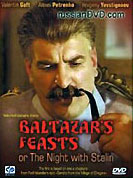The Feasts of Valtasar, or The Night with Stalin
(titre non officiel)-
Piry Valtasara, ili Noč so Stalinym (plus)

Réalisation:
Yuri KaraPhotographie:
Vadim SemenovykhActeurs·trices:
Aleksey Petrenko, Валентин Гафт, Aleksandr Feklistov, Sergey Nikonenko, Yuri Kara, Mikhail Kononov, Sergey Nikolaev, Лариса Белогурова (plus)Critiques (3)
Grâce au formidable travail des auteurs avec un seul repas et quelques flashbacks, on pourrait écrire beaucoup de choses : sur le paradoxe grâce auquel le premier pays socialiste (le plus progressiste de l'époque) n'a réussi en 20 ans d'existence qu'à faire revivre d'anciennes pratiques byzantines patrimoniales, où le souverain est le soleil - illuminant tout de sa grandeur et vers lequel tous les regards et espoirs de la nation se tournent à nouveau. Ou encore sur la manière dont un terroriste géorgien est devenu le dirigeant russe, etc... En tant que paradoxe cinématographique et artistique (mais merci pour cela), il me semble personnellement que grâce au talent des auteurs du film et du livre, le personnage de Staline échappe à une division manichéenne simple entre le bien absolu et le mal, le jour et la nuit. La cruauté reste, mais l'ambivalence de ses gestes, tout comme les confessions presque émouvantes (bien sûr, imaginaires) de Staline sur le pouvoir, rendent cette cruauté crédible, car humaine. Parce que l'être humain est toujours plutôt une énigme qu'une incarnation de principe (que ce soit celui du mal ou d'autre chose). Les auteurs ont réussi un paradoxe très gratifiant pour le spectateur - ils ont fidèlement montré les pires aspect de Staline, mais en ont fait un être humain. Ce qui n'est pas le cas des films du type "La chute de Berlin", etc.
()
From all the perestroika films I had the opportunity to see, Baltazar's Feast, perhaps with the exception of the satirical City of Zero, impressed me the most. It is far more chilling and raw than the much more famous Abuladze's Repentance. After all, the five years that separate both films broke the ice and allowed us to call things by their real names. To truly appreciate this cinematic experience, it is better to be familiar with the historical realities of the Soviet Union and Georgia as the birthplace of Stalin and his closest collaborator Beria, as the film, or rather the literary source, deals with real names and historical events. The film is a perfect example of political will and an analysis of how dictatorships are born and function. Meticulous direction, strong acting performances, and a quality script - what more could one ask for? Overall impression: 95%.
()
A captivating autopsy of the fatality of power, a film that balances on the edge of speculation, but with its image of a feast of the powerful (so popular since ancient times), it reveals one of the possible interpretations of Stalin's personality. A personality who may have found himself in the schizophrenic captivity of contradictory halves – Dzhugashvili, the farmer, and Stalin, a world ruler. And when Koba chose the second, he found himself in the pliers of absolute power, which he himself held in his hands, but which he could not let go of for even a moment. Director Yuri Kara described Stalin as a strange mixture of fragility, quiet madness and brutality (which he himself sees as a necessity of existence), as a manipulator who, in a single word, turns men into ruins and ruins into men. And a feast in his honor, a feast in the middle of the leader's vacation in Abkhazia, provides the perfect space to play a special satirical-tragic game in which nothing seems to happen, but in which everyone's lives are at stake every second (except Stalin's, of course). The Feasts of Valtasar, or The Night with Stalin is a typical example of subsurface drama, where all the tension takes place under the masks of the individual characters, which have a rather caricature nature. Its emotional highlights are magnificent, and the scene of the egg-shooting from the chef's head is one of the best images of power and humiliation I've ever seen in a movie. It is amazing how little means it takes for Kara to express his view of the cursed and adored leader, to spread his vision of the communist apparatus in front of the viewer, the most resentful point of which is not the surprisingly charismatic Stalin, but the sly and spineless pig Berija. I was somewhat taken aback by the narrative aspect of the film, which acts as a "memory" of one of the performers of the feast, but in the process shatters into a typical Russian polyphony of views. And I consider the incredibly convincing performance of Alexej Petrenko in the title role to be the strongest motivation for the fifth star...
()
Annonces